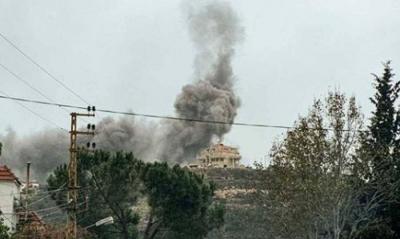Lebanese citizens are anxiously awaiting the timing of an Israeli strike on Iran and its implications for them. This concern intersects with warnings from experts that Lebanon will pay a heavy price for the Iranian-Israeli confrontation, especially since Tehran uses Hezbollah as its primary line of defense. In anticipation of the expected Israeli response to Iran's recent attack, the southern front of Lebanon is experiencing significant escalation. Military and strategic expert Brigadier General Khalil Halou believes that the Lebanese arena will be part of Israel's retaliation against Tehran.
Halou indicates in a statement to "Asharq Al-Awsat" that the Israeli response will target several objectives both inside and outside Iran and is likely to include a preemptive action against Hezbollah in Lebanon, striking many of its military positions. He notes that the United States is still restraining Tel Aviv’s push to deliver a crippling blow to Iran and its allies, but that restraint will not last long as long as Israeli Prime Minister Benjamin Netanyahu seeks war at any cost.
Experts agree that a response to the Iranian strike is inevitable, regardless of whether it achieves its objectives, and they consider the possibility of events escalating into a full-blown confrontation in which Lebanon will be one of the battlegrounds. Dr. Riyad Qahwaji, a researcher in military affairs and an expert in security and armament, asserts that any escalation in the region inevitably affects Lebanon, especially when the confrontation is between Iran and Israel. He confirms to "Asharq Al-Awsat" that Iran has always relied on Hezbollah as its first line of defense, and whenever the battle intensifies between it and Israel, Lebanon pays the price.
Qahwaji states: "We must wait for the nature of the Israeli response; Israeli options are numerous, but Tel Aviv takes into account U.S. pressures to avoid slipping into war." He warns that events are developing rapidly and emphasizes that Hezbollah plays a crucial role in this battle, more so than Iran in terms of its ability to inflict damage on Israel.
In anticipation of the yet-unknown timing and location of the Israeli response, the Lebanese arena is preparing to be part of the confrontation, having witnessed a recent increase in military operations executed by Hezbollah against Israel. The Iranian attack on Israel, despite its magnitude, resulted in disappointing outcomes, failing to achieve its objectives and causing harm to the Israeli side, which may compel Iran to adopt a different approach.
Brigadier General Halou emphasizes that Tehran demonstrated its maximum capabilities in the strike against Israel, and in the absence of a significant impact, it may be compelled to focus on enhancing its nuclear capabilities and strengthening its allies who would respond on its behalf, the foremost being Hezbollah. He adds that Hezbollah has undoubtedly gained operational experience to avoid the downing of its drones and missiles, successfully evading the Israeli defense system in its latest operation and hitting the Israeli military base in the town of Arab al-Aramsha.
He asserts that, given these developments, Lebanon should be concerned about what is to come, which may hasten a powerful Israeli strike deep within Lebanon before responding to Tehran. Experts agree that the impact of Iranian threats to Israel remains limited, regardless of the strength of its military and armaments. Dr. Riyad Qahwaji notes that Iran possesses a vast arsenal of ballistic missiles, cruise missiles, and drones, but their effectiveness is limited due to the approximately 2000 km distance separating it from Israel.
No matter what type of weapon Iran launches, Israel is capable of countering and successfully intercepting it, as demonstrated with its allies in the recent strike. He points out that Tehran used its latest weaponry, contrary to popular belief, and it should not be forgotten that Hezbollah possesses some of the weapons held by the Revolutionary Guard, especially ballistic missiles and drones, which have not been exhausted except for the "Burkan" missile, which shows its effectiveness from relatively short ranges.
Qahwaji believes that if Hezbollah decides to launch an attack similar to Iran's in terms of speed and fire intensity, it could inflict much more damage on Israel than the Iranian strikes. Therefore, Hezbollah plays a fundamental role, and Israel is well aware of this fact. Tel Aviv does not cease to send signals that prepare the ground for a large-scale operation in Lebanon, although its extent and timing remain unclear.
Qahwaji emphasizes that numerous scenarios remain contingent on developments. He adds, "We are now in a period of escalation that will be followed by stronger escalation before diplomatic efforts begin to contain the situation." He highlighted reports of Israel conducting exercises to counter an attack being prepared by Hezbollah, similar to the 'Al-Aqsa Flood' operation, and how it will respond, seeing this as a significant message indicating that Hezbollah's presence on the northern border will not be acceptable to Israel, which seeks its elimination at any cost.




